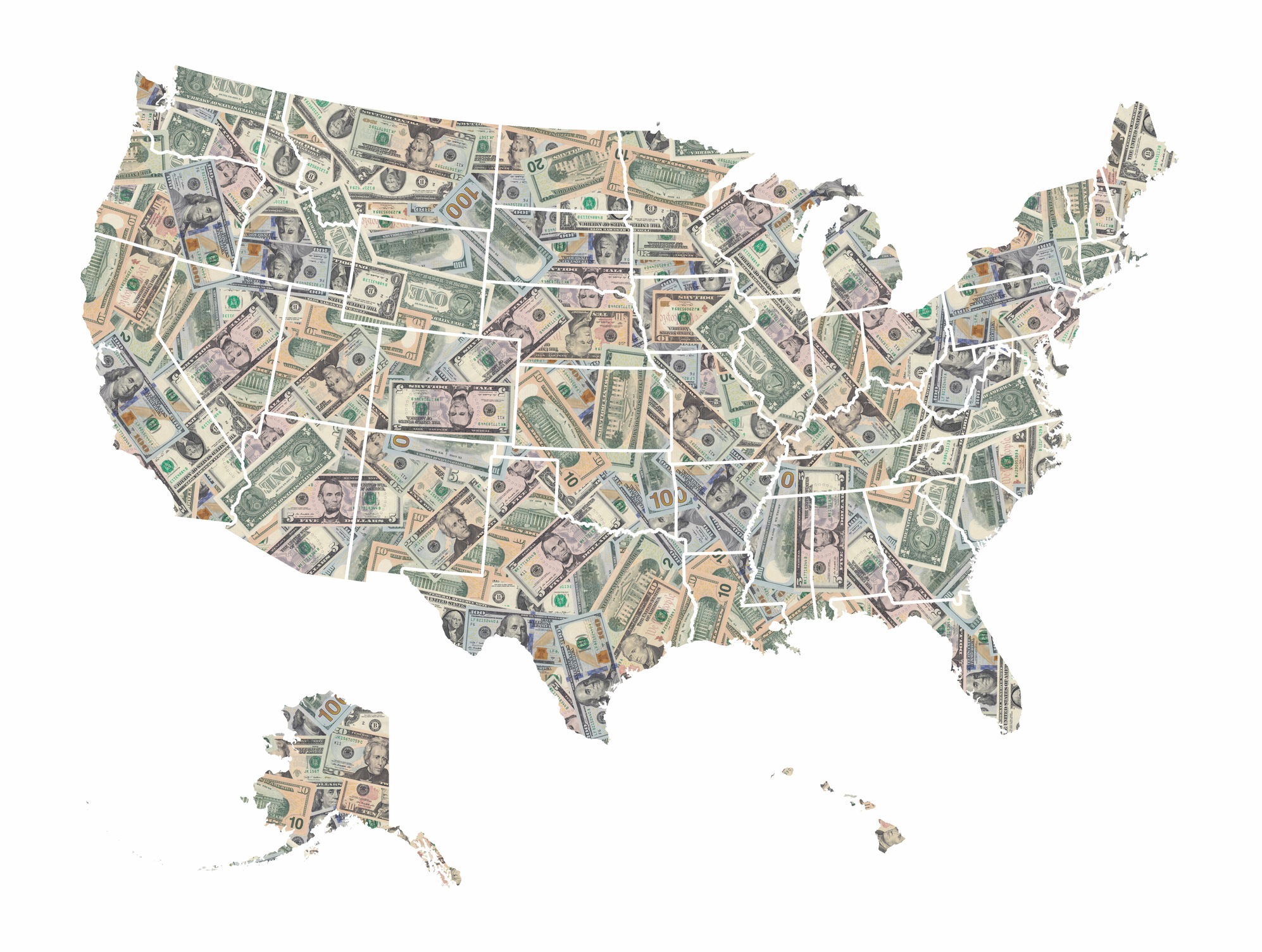Ten Tax-Friendly States for Retirees in 2025
If you’re looking for the best states to retire for taxes, you may want to consider one of these most tax-friendly states for retirees.

Kate Schubel

Profit and prosper with the best of Kiplinger's advice on investing, taxes, retirement, personal finance and much more. Delivered daily. Enter your email in the box and click Sign Me Up.
You are now subscribed
Your newsletter sign-up was successful
Want to add more newsletters?

Delivered daily
Kiplinger Today
Profit and prosper with the best of Kiplinger's advice on investing, taxes, retirement, personal finance and much more delivered daily. Smart money moves start here.

Sent five days a week
Kiplinger A Step Ahead
Get practical help to make better financial decisions in your everyday life, from spending to savings on top deals.

Delivered daily
Kiplinger Closing Bell
Get today's biggest financial and investing headlines delivered to your inbox every day the U.S. stock market is open.

Sent twice a week
Kiplinger Adviser Intel
Financial pros across the country share best practices and fresh tactics to preserve and grow your wealth.

Delivered weekly
Kiplinger Tax Tips
Trim your federal and state tax bills with practical tax-planning and tax-cutting strategies.

Sent twice a week
Kiplinger Retirement Tips
Your twice-a-week guide to planning and enjoying a financially secure and richly rewarding retirement

Sent bimonthly.
Kiplinger Adviser Angle
Insights for advisers, wealth managers and other financial professionals.

Sent twice a week
Kiplinger Investing Weekly
Your twice-a-week roundup of promising stocks, funds, companies and industries you should consider, ones you should avoid, and why.

Sent weekly for six weeks
Kiplinger Invest for Retirement
Your step-by-step six-part series on how to invest for retirement, from devising a successful strategy to exactly which investments to choose.
When choosing which state to retire, taxes may have crossed your mind. Knowing which are the most tax-friendly states for retirees may help you decide. Just keep in mind that no state has zero taxes. So, where some taxes are low, other types may be high.
Considering the pros and cons of state taxes in retirement will provide you with the best overall tax picture. Additionally, how the IRS taxes various types of retirement income can affect your tax burden.
Related: Retirees in These 7 States Could Pay Less Property Taxes Next Year
Most tax-friendly states for retirees
The ranking for the most tax-friendly states for retirees is based on two major factors.
Only states that don't tax retirement benefits were considered. Of those 13 states, the 10 with the lowest median property taxes paid were chosen.
Property tax bill amounts are based on the most recent 5-year estimate available from the US Census Bureau.
Key Points
- Tax Friendly Features. When evaluating a state's retirement taxes, state income taxes, property taxes, and estate and inheritance taxes are important considerations.
- Get a Holistic View. Retirees should also factor in other key elements, such as local crime rates, the overall cost of living, and the political climate, before deciding where to relocate.
- Watch out for Caveats. A state might offer tax breaks in one area, like property taxes, while having higher taxes in other areas, such as sales taxes. So be aware that no state is entirely "tax-free."

10. Texas
Texas comes in on this list as the 10th most tax-friendly state for retirees. This is largely because the state has no income tax. So, not only will Texas not tax your retirement benefits, but the state won’t tax any other type of income, should you have any.
Although property taxes in the state are high, with a median tax bill of $4,111, they are less than in some other states that don’t tax retirement income.
Another positive to living in the Lone Star State is that there are no estate or inheritance taxes, so your heirs won’t be left with a hefty state tax bill.
Potential cons of retiring in Texas
- As stated, property taxes are currently on the high end, but since a Texas property tax relief package became effective last year, this con may soon disappear for some homeowners.
- Sales taxes are also a bit high, with an average combined rate of 8.2%, according to the Tax Foundation.

9. Alaska
The median property tax bill in Alaska is slightly lower than in Texas, at $3,785. While this number is still high when compared to most other states, the lack of state income tax in Alaska places the state at number nine.
Alaskans can even get paid for living in the state, thanks to the Alaska Permanent Fund Dividend. For the 2024 tax year, the dividend amount was $1,702.
Also, Alaska won’t tax your loved ones once you’re gone, since there are no estate or inheritance taxes in Alaska.
Potential cons of retiring in Alaska
- Alaska doesn’t have a statewide sales tax, which is a plus. But sales taxes easily make it on the cons list when considering local taxes, which can climb to 7.85%.
- Localities can also levy sales tax on your groceries. So, you may see a hike in your grocery bills if you retire in Alaska.

8. Pennsylvania
Pennsylvania makes the list of tax-friendly places for retirees because it doesn’t tax retirement benefits. And even if you do have taxable income (such as wages), the Commonwealth has a flat tax rate of 3.07%, which is less than in most states that impose an income tax.
Although the median property tax bill in Pennsylvania exceeds $3,200, property taxes are still lower than in some states that don’t tax your retirement income.
Potential cons of retiring in Pennsylvania
- Although some residents can take advantage of Pennsylvania rebates for property taxes paid, limitations apply.
- You may also want to consider how not tax-friendly Pennsylvania is for your heirs. If you plan to leave your loved ones an inheritance, they could face a big tax bill due to death taxes in the Commonwealth.

7. Iowa
Median property tax bills fall below $2,800 in Iowa, the seventh most tax-friendly state to retire to on this list. Between slightly more reasonable property taxes and no state tax on traditional retirement benefits, Iowa could be an affordable place to live out your retirement.
And while the state does tax other types of income, Iowa recently lowered its income tax to a flat rate of 3.8%. That's significantly lower than the highest income tax rate last year, which was 5.7%.
Potential cons of retiring in Iowa
- Iowa has an income surtax for schools that localities can tax based on the taxpayer’s state income tax liability.
- The state sales tax is 6%, but local taxes can increase that rate to 8%.

6. South Dakota
South Dakota’s lack of income tax is appealing, especially if you have non-traditional forms of retirement income, such as income from investments.
At $2,590, the median property tax bill is still on the high end but is lower than in several other states that don’t impose an income tax.
South Dakota may also be a good choice for retirees who don’t want to leave their family members with a tax bill. There are no estate or inheritance taxes in the state.
Potential cons of retiring in South Dakota
- South Dakota is one of the states that still taxes groceries.
- The state recently reduced its grocery tax rate by 0.3%, from 4.5% to 4.2%. But that "grocery tax holiday" is set to expire June 30, 2027.

5. Florida
Florida is a popular retirement destination, but warm weather isn't the only reason people retire in the Sunshine State. There are no state income taxes in Florida, which means you can continue working, receive your retirement benefits, and enjoy your dividends, all without worrying about the state taking a cut.
At $2,555, median property taxes aren’t too high compared with other states. Additionally, some Floridians are eligible for a homestead exemption up to the entire taxable value of their property.
Florida also doesn’t have estate or inheritance taxes, so your loved ones won’t need to share a chunk of their inheritance with the state.
Potential cons of retiring in Florida
- In recent years, Florida home prices have shot up 14.6% annually.
- While Gov. Ron DeSantis is seriously considering eliminating Florida property taxes, abolishing property taxes in Florida could be problematic due to potential budget cuts and higher sales taxes.
Related: Ten Cheapest Places to Live in Florida.

4. Nevada
Las Vegas often comes to mind for many people when they think of Nevada, but the state has more to offer than famous casinos, gambling, and entertainment. For starters, there is no state income tax in Nevada. That means all your income is safe from state taxes, rather than only your retirement benefits.
The median property tax bill in Nevada is lower than in many other states, at $1,970. And with an average effective tax rate of 0.49%, even homeowners with high property valuations may see low property tax bills.
There are no estate or inheritance taxes in Nevada, which makes it a very tax-friendly place for the loved ones you’ll leave behind one day.
Potential cons of retiring in Nevada
- While Nevada doesn’t quite make the cut for having one of the top 10 highest sales taxes in the country, the sales tax rate is still high.
- The average combined state and local sales tax rate is 8.24% in Nevada, but it’s important to note that you won’t pay this tax on groceries or prescription medications.
Related: The Most Tax-Friendly State For Middle-Class Families

3. Wyoming
Wyoming is another retirement destination without an income tax so that already makes it a tax-friendly state for retirees. And with a median property tax bill of $1,659, Wyoming is even more affordable, at least where taxes are concerned.
If you’re looking for another tax benefit to choosing Wyoming as your retirement destination, you’re in luck. There are no estate or inheritance taxes in the state, so your heirs won’t inherit a state tax bill. Plus, the Cowboy State has one of the lowest sales taxes in the country, with a state sales tax rate of just 4%, and a combined average state and local rate of 5.56%.
Potential cons of retiring in Wyoming
- Although gas taxes in Wyoming are reasonable when compared to most other states, Wyoming’s EV tax is not.
- If you drive an electric vehicle, prepare yourself for an annual ‘decal fee’ of $200.

2. Tennessee
Yet another state with no income tax, Tennessee comes in as the second most tax-friendly state to live out your retirement. With a median tax bill of $1,400, Tennessee has several relatively cheap places to live and is one of the most retirement-friendly states for homeowners.
Another tax benefit to living in the Volunteer State is the lack of estate and inheritance taxes. So, even if you have a sizable estate, your heirs won’t have to share it with the state.
Potential cons of retiring in Tennessee
- Tennessee has a high statewide sales tax rate of 7%, and localities can impose separate sales taxes of their own.
- Additionally, the state taxes groceries. And though the grocery tax is reduced to 4%, it’s still not ideal.

1. Mississippi
Of all the states that won’t take a cut of traditional retirement income, Mississippi has the lowest property taxes, with a median tax bill of $1,189. So, Mississippi earns its place as the most tax-friendly U.S. state for retirees.
You won’t pass on a big state tax bill to your loved ones when you’re gone, either. Like most other states on this list, there are no estate or inheritance taxes in Mississippi.
Potential cons of retiring in Mississippi
- Mississippi isn’t perfect where taxes are concerned since the state still taxes groceries.
- The state taxes groceries at a higher rate than most others in the country, at 5%. This is because of all the states with a grocery tax, Mississippi's reduced rate is the second-highest.
For more information about retiring in Mississippi, check out Kiplinger's report, The Most Tax-Friendly State for Retirement.
Read More
- 15 States That Don't Tax Your Pension
- States That Won't Tax Your Death
- Taxes in Retirement: How All 50 States Tax Retirees
- States That Won't Tax Your Retirement Income in 2025
Profit and prosper with the best of Kiplinger's advice on investing, taxes, retirement, personal finance and much more. Delivered daily. Enter your email in the box and click Sign Me Up.

Katelyn has more than 6 years of experience working in tax and finance. While she specialized in tax content while working at Kiplinger from 2023 to 2024, Katelyn has also written for digital publications on topics including insurance, retirement, and financial planning and had financial advice commissioned by national print publications. She believes knowledge is the key to success and enjoys providing content that educates and informs.
- Kate SchubelTax Writer
-
 Ask the Tax Editor: Federal Income Tax Deductions
Ask the Tax Editor: Federal Income Tax DeductionsAsk the Editor In this week's Ask the Editor Q&A, Joy Taylor answers questions on federal income tax deductions
-
 States With No-Fault Car Insurance Laws (and How No-Fault Car Insurance Works)
States With No-Fault Car Insurance Laws (and How No-Fault Car Insurance Works)A breakdown of the confusing rules around no-fault car insurance in every state where it exists.
-
 7 Frugal Habits to Keep Even When You're Rich
7 Frugal Habits to Keep Even When You're RichSome frugal habits are worth it, no matter what tax bracket you're in.
-
 Avoid a Tax Surprise After Your 2026 Super Bowl Bets: A New IRS Rule to Know
Avoid a Tax Surprise After Your 2026 Super Bowl Bets: A New IRS Rule to KnowTaxable Income When Super Bowl LX hype fades, some fans may be surprised to learn that sports betting tax rules have shifted.
-
 Should You Do Your Own Taxes This Year or Hire a Pro?
Should You Do Your Own Taxes This Year or Hire a Pro?Taxes Doing your own taxes isn’t easy, and hiring a tax pro isn’t cheap. Here’s a guide to help you figure out whether to tackle the job on your own or hire a professional.
-
 Can I Deduct My Pet On My Taxes?
Can I Deduct My Pet On My Taxes?Tax Deductions Your cat isn't a dependent, but your guard dog might be a business expense. Here are the IRS rules for pet-related tax deductions in 2026.
-
 Don't Overpay the IRS: 6 Tax Mistakes That Could Be Raising Your Bill
Don't Overpay the IRS: 6 Tax Mistakes That Could Be Raising Your BillTax Tips Is your income tax bill bigger than expected? Here's how you should prepare for next year.
-
 Oregon Tax Kicker in 2026: What's Your Refund?
Oregon Tax Kicker in 2026: What's Your Refund?State Tax The Oregon kicker for 2025 state income taxes is coming. Here's how to calculate your credit and the eligibility rules.
-
 3 Retirement Changes to Watch in 2026: Tax Edition
3 Retirement Changes to Watch in 2026: Tax EditionRetirement Taxes Between the Social Security "senior bonus" phaseout and changes to Roth tax rules, your 2026 retirement plan may need an update. Here's what to know.
-
 Tax Season 2026 Is Here: 8 Big Changes to Know Before You File
Tax Season 2026 Is Here: 8 Big Changes to Know Before You FileTax Season Due to several major tax rule changes, your 2025 return might feel unfamiliar even if your income looks the same.
-
 Do You Pay Property Taxes in Tennessee? What You Need to Know in 2026
Do You Pay Property Taxes in Tennessee? What You Need to Know in 2026Property Taxes State lawmakers are moving to ban state property taxes, but can they stop the local rate spike? Here's how 2026 could lower your Tennessee property tax bill.
